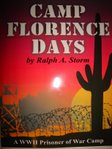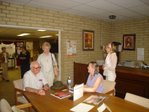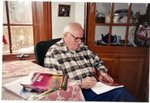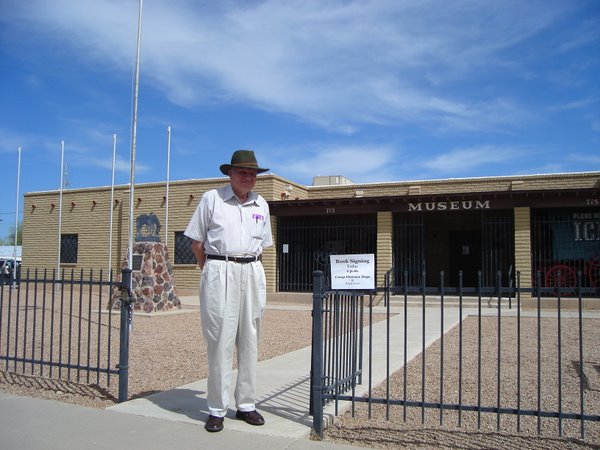http://www.zwire.com/site/news.cfm?newsid=17689250&BRD=1817&PAG=461&dept_id=68561&rfi=8
Former MP recalls days at POW, Relocation campsBy MARK COWLING, Staff Writer, Casa Grande Dispatch January 09, 2007
FLORENCE - A Wisconsin man has written a book about his experiences working as an American military policeman in the Florence prisoner-of-war camps during World War II.
"Camp Florence Days" by Ralph A. Storm puts that time in historical context and also describes his jobs away from Florence in chapters on the Poston relocation camp for Japanese-Americans and Italian POWs at work in cotton-picking season in Eloy:"The guards with their Enfield rifles spent the day patrolling the edges of the fields. I was not aware of any prisoner escapes while under close guard at Florence or Eloy. During basic training the guards had been given precise instruction on how to guard prisoners on work details: If a prisoner began to wander away, a guard would shout "Halt" three times before shooting and if a guard should shoot a prisoner, he would be given a carton of cigarettes, some leave time and perhaps a transfer," Storm wrote.
Storm, 82, came to Camp Florence as a new high school graduate on July 10, 1943 and served there until May 1944. He said he probably couldn't have remembered so much about those days without the daily letters he wrote home, about 300 in all.
"My mother kept them in shoe boxes. I reread them and found a lot of things I'd forgotten," he said in a phone interview from his home in Eau Claire.
He recalled Italian prisoners arriving by train, 500 to 600 at a time and still in their military uniforms, as he and other MPs stood with their Tommy guns. But at that point, the prisoners weren't interested in offering much trouble.
"They were a tired-looking bunch," Storm recalled, " ... glad to get in the barracks and get a shower."
At the Poston relocation camp, Storm wrote that the predominant religion was Buddhism and its practice was allowed. But several internees were also Christian. On Easter Sunday morning in 1944, Storm recalled seeing "several dozen" Japanese get up for a sunrise service, and others celebrate another Easter service.
Storm also has memories of downtown Florence and some of the local taverns at that time. In a chapter entitled "Recreation," he quotes from the local newspaper's account of a party at the Florence Woman's Club:
"Open house for soldiers from the army camp near Florence was held with a group of young ladies invited for dancing and games. The committee served refreshments and the evening was enjoyed by all. The Committee, consisting of Mesdames W.S.S. Branaman, Norman R. Freeman, Ronald J. Ellis, and Messrs. Dugald Stewart, J. Houston Allen, Father Joseph Dominic Jacques, Rev. S.B. Hannah and Rev. John Knight, are gathering all kinds of equipment to be placed in the building in order to make it a comfortably equipped center for lounging, letter writing, reading and whatever else solders off duty care to do. The Florence Woman's Club public library is also centered in the clubhouse, and the books will be available for the soldiers. The center will be open each evening from 7-9; social evening on Tuesday."
Storm also wrote of how the camp changed after he left it:
"With Italians no longer in the prisoner-of-war category, these men were moved to form labor gangs in California. After the invasion of Normandy in June 1944, the first trainloads of Germans came to Florence. ... When admitted to the camp hospital, the prisoners were likely to be under the care of black nurses. Both arrangements, Jewish doctors and black nurses, were violations of Nazi racial doctrines."
Storm also wrote of how German POWs dispensed their own justice in a chapter entitled "Murder at Papago Park."
Unfortunately, his memories of the Italians don't include the unique chapel those prisoners built. He does remember a construction project of some kind under way in the spring shortly before he left. Some Florence Gardens residents hope to construct a replica of the chapel.
It turned out Florence was only Storm's first perspective of the war. When he left in 1944, he spent a summer in training, then served in Belgium, Luxembourg and Germany. He was in Austria when the war ended.
The book includes several pages of black-and-white photos, maps and documents, some credited to the Pinal County Historical Society Museum in Florence. Storm said he decided to put his story into a book at the suggestion of Chris Reid at the museum. A limited number of copies are for sale at the museum; Storm said if there's more interest, there may be another printing.







